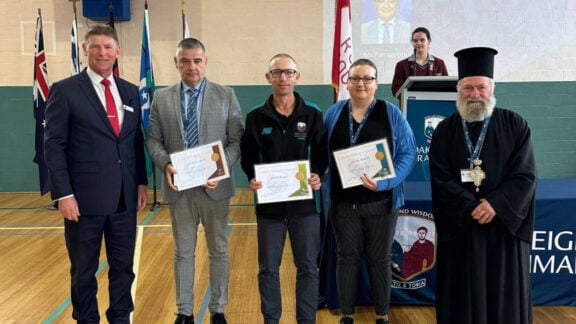Children and young people – often ‘forgotten’ and ‘silent’ victim-survivors of family violence – can remain invisible when it comes to services, a new report has revealed.
The violence they see and often experience can have lifelong consequences if they do not receive support for mental health and other issues.
The report says they can experience suicide ideation, substance misuse, homelessness, and learning difficulties, as well as issues that may lead to future perpetration of family violence.
An estimated 2.6 million Australians have witnessed violence towards their parent by a partner before the age of 15 (ABS:2023), and there is a need to address the cracks in the system that are failing these children.
Dimopoulos looking for solutions
Neos Kosmos spoke to Dr Georgina Dimopoulos, an expert on family law, children’s rights, and family violence from Southern Cross University, about the findings in Children’s Voices for Change she led. The research points to ongoing systemic barriers to supporting children as victim-survivors in their own right in Victoria.
The study is a call to action in the care and support of children who experienced family violence and emphasised the importance of listening to children’s voices and respecting their agency when determining their needs to feel safe and supported.
“It is probably one of the very few Australian projects that has engaged directly with children to find out what they need to feel safe and well”, Dr Dimopoulos says.
The Southern Cross University project, Children’s Voices for Change, was funded by the Victorian Government through Family Safety Victoria in partnership with Safe and Equal and the Centre for Excellence in Child and Family Welfare. The research included a survey of 320 practitioners and 23 children and young people who have accessed family violence support services in Victoria.
The young victim-survivors not heard
The report says that children need connection, trust and loving relationships with family, friends and pets to help them heal from their experiences of family violence. They also want to ensure that they and their family members are safe and healthy and have stable housing and enough money to meet their basic needs.
Children’s Voices for Change also highlights the importance of building and maintaining trust between the child and their practitioner. Children and young people described some services as breaching their trust by disclosing information to others. They also reported that many services do not understand their experiences of family violence. Some said that police misidentified the person using violence.
“Children have repeatedly told us that they want services to listen to them, to understand them, and to ask them what they need to be safe. There is no ‘one size fits all’ for supporting children who have experienced family violence. Children don’t always have the same needs as their parent or carer or their siblings,” Dr Dimopoulos said. For practitioners, children’s fear or lack of trust were sometimes barriers to engagement, which affected services’ ability to provide adequate support.

Photo: Image supplied
Report calls for direct engagement with children
The report highlights the need for services to engage directly with children to understand their distinct experiences and needs.
One of the most significant barriers that hinder the support children can use to overcome the violence witnessed or subjected to is that a child’s case is attached to an adult – parent and or carer – in all the services provided, and as a result, their distinct needs are not recorded.
“Our research shows that practitioners are doing their best to support children who have experienced family violence within a system that still treats children as invisible, silent victims,” Dr Dimopoulos said.
The study revealed that seeking feedback from children about their service experience is uncommon in Victoria. Less than half of the practitioners surveyed said their service doesn’t seek input. When they do, the feedback is often through their parent, carer, or caseworker.
Children’s feedback tool
The team has released a practical tool, The Change: Children’s Feedback Tool, to help service providers provide more tailored care to children from family violence.
The tool is available online, and the children involved in the study were the focus of its design.
To give some “context to the tool”, Dr Dimopoulos said that one of the issues is that children who are not seen as victim-survivors of family violence in their own right are “often treated by services as just an extension of their mother, and so the services don’t always engage directly with the children themselves to understand what they need to recover.”
“So this tool aims to support practitioners of services to get meaningful feedback from children at different points throughout their engagement with them.”
The team had a youth advisory group, and in that group of, four young people aged 11-25 who had experienced family violence.
“They [the advisory team] guided us to develop what we called a children’s online interactive activity that helped us get the stories for this project. We heard the stories of 23 children and young people in Victoria who had experienced family violence and had accessed services in Victoria.”
Lack of support impacts children for life
Dr Dimopoulos said that some of the young people surveyed “spoke of the long-term effects on their ability to work because they hadn’t received appropriate support when they were younger.”
“They talked about the issue of trust and losing trust in adults, and even the issue of mental health,” Dr Dimopoulos said.
The expert also said that “many young people” suffered disability, “a physical or mental health condition, that arose from family violence”.
“Anxiety, depression, and post-traumatic stress disorder” are common, according to Dr Dimopoulos.
“There are profound impacts on children’s health and well-being, their social and emotional development as well, their engagement in school and their educational outcomes.”
Children and young people also recounted “negative” experiences with Victoria Police.
“They spoke of the police misidentifying the person using violence, accusing the children of lying about what they’d seen or what they’d experienced and the feeling that the police was not doing enough to ensure their safety.”
Dr Dimopoulos has been researching family law, family violence and children’s rights for many years.
“Children’s voices and children’s stories must be the trigger for change. I am very privileged and humbled that children and young people are willing to open up and share their stories with me in my research. If I can provide a platform for their voices to create change in systems and services to help other children and young people, then that inspires me in my work.”
The Children’s Feedback tool, www.changefeedbacktool.au, is for “any service or practitioner who works with children who have experienced family violence, to use that tool however they like.”
Systemic change needed
According to Dr Dimopoulos, the changes needed require systemic and cultural change.
“Services, listening to children, believing children, appreciating that children know what they need to feel safe and well. It’s those recommendations and reforms that take time.
Dr Dimopoulos also said that “each practitioner can adapt their practice to listen to children and engage meaningfully and directly with them, which can make a difference.”
The family law and domestic violence expert hopes that the report’s recommendations are considered. She is calling for increased funding for a specialist family violence sector, training, resources for practitioners, and a “collective willingness to listen to and respect children as having distinct needs and appreciating that they do have a voice.”
“There’s a lot more work to be done. But this is a step.”









